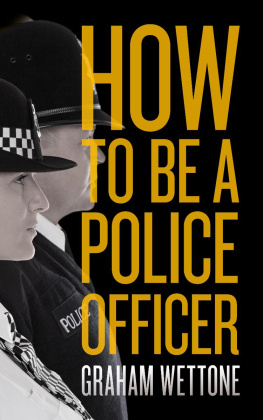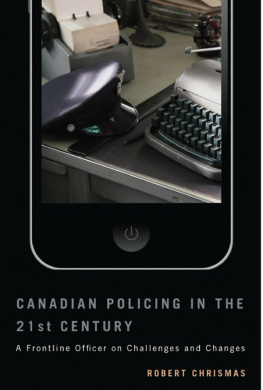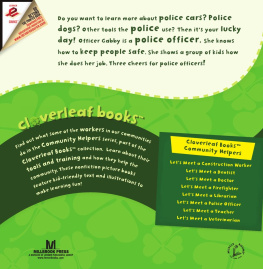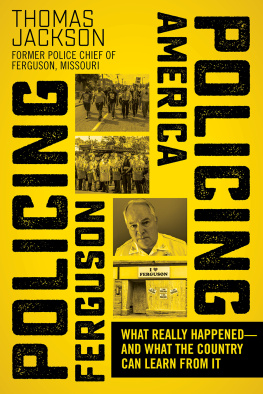This book is dedicated firstly to my mum, who passed away in 2008, for her inspiration, selfless commitment and dedication when raising me mostly on her own. She instilled in me the values, honesty and work ethic that have sustained me in my life and policing career. I owe her everything and miss her daily. She would have been so proud of this.
Secondly, and equally as importantly, I dedicate this to everyone who ever worked or hopes to work on the thin blue line. Thank you for all you have done, are doing and will do. The police became my family and will always remain so.
WHY DO YOU WANT TO BE
A POLICE OFFICER?
T he first thing you need to ask yourself is Why? Of all the professions and occupations you can embark upon, why on earth in this day and age would any sane, sensible and balanced individual consider becoming a police officer? The recent murder of PC Keith Palmer highlights the dangers that officers face every day whilst policing the streets of Britain. This devastating tragedy, along with the deaths of PC Keith Blakelock, PC Yvonne Fletcher, PC Dave Phillips and others, demonstrates the ultimate risks of the job; and sadly, such risks are unlikely to go away.
The police service, or force as some still like to call it, seems to be constantly criticised for current or alleged historical errors and this blame culture will also apply to you whether you joined thirty years ago or thirty minutes ago. You will be held responsible for every mismanaged major crime scene and inquiry, every public disaster or protest that arguably went wrong and every perceived miscarriage of justice. That is not to say that the police have not made some monumental errors over the last forty years. I served as an operational officer, and I hasten to add that I was not involved in, or even present at, almost all of them! You should be prepared for the reality that the errors and organisational mistakes made by the entire police service will be deposited at your feet by someone, somewhere, at some time.
The police do seem to attract headlines for mistakes more than any other organisation and in my opinion, there is a good reason for it. The first thing you need to understand is the fundamental principle of British policing, which is that we police by public consent. This is a phrase that you will hear throughout your time in the police and it is essential you understand and apply it every day you work as a police officer in the UK. It means that the police protect and serve the public and can do so because the vast majority of the public fully support their police service. It is for this reason that any mistake made by the police is thoroughly examined, arguably in finer detail than errors made by those in any other profession, and questions are asked of the police to justify all their actions and decisions. Before you embark upon a career in policing, you should know that at some stage you may be asked to account for an error that had nothing to do with you personally, but you may be viewed by the very public you protect as guilty by association. Once you wear the uniform or carry a warrant card, you are considered partly responsible for policing as a whole. The public demands the best from their police service and deserves honest and forthright answers when the police get things wrong; although regrettably, this has not always been the case, as several high-profile cases have shown.
So, as a police officer, what can you expect and what may noticeably change in your everyday life? Every armchair expert will make a beeline for you in pubs and at parties and ask for your view on Hillsborough, the Lawrence inquiry and any other high-profile case considered as being far from the polices finest hour. The moment you join the police, some may label you with that well-worn title institutionally racist, just by virtue of holding the office of constable. Well, thats certainly how the Metropolitan Police is perceived, but its also now generally assumed of anyone wearing the uniform. This stigma came from the Macpherson inquiry into the Stephen Lawrence murder and has been regularly repeated over the years in a number of cases and topics.
I grew up in south London and attended a diverse comprehensive school. I have never considered myself racist, just a criminalist who loathes all bullies. I worked as a uniformed front-line officer in 1993 and I spent my working days seeking out active criminals in the area and doing my best to disrupt and detain them to prevent them committing crime. It mattered not a jot what ethnicity or background they were from. My colleagues and I only cared that they were committing crime.
Policing now serves a large area and so there is a clear need for the police to represent the community. The police service itself is now more diverse than ever before. You will work alongside people from all sorts of backgrounds and beliefs and you will undoubtedly forge close friendships with many of them. It is inconceivable then that you will not change in many ways by virtue of what you encounter at work and who you work with. Like all walks of life and professions, you take something from every person you meet, including your parents, friends, family and work colleagues.
Policing has changed over the decades since I joined, and those thinking of starting their careers now have to ask themselves, What sort of police officer do I want to be? There have been some officers who have behaved wrongly, poorly and occasionally criminally, but they are in the minority and generally despised by the majority who just want to do their job well. You will hopefully follow the good example of diligent colleagues around you. You cannot just teach policing from a book or an online training package; new officers need to watch and learn from experienced police officers to observe different ways or methods of working. Ask yourself what sort of officer you want to be and then learn from those around you or find a good book that tells you how to be a police officer!
When you answer the dreaded question, What do you do, then? with Oh, Im a police officer, the facial expression of your new-found friend or potential romantic partner will usually change and you will no doubt hear all about their speeding ticket that was unfair or way too harsh, or the fine for using a mobile phone when it wasnt really their fault or the phone wasnt being used I was just reading a text! As it happens, very few police officers refer to themselves as being a cop and usually say instead that they are in the job. This isnt just a euphemism to avoid complaints for many current or retired police officers, the job is the only one theyve ever really wanted.
No matter how much an officer loves their job, however, be under no false illusions here. The incidents and things you will be called upon to deal with are possibly the most terrible things you can see in society. You will be exposed to the very worst in some people and will witness some truly awful scenes. On many occasions, you cannot go home and honestly answer the question from your loved ones and family, Did you have a good day at work? The words to answer that simple question repeated in many other households across the country do not come so easily for many police officers. As terrible as it can be, however, you may well find some previously hidden inner strength and courage in yourself whilst dealing with the most shocking situations. You will astonish yourself with what you can cope with, although the training and the camaraderie of your fellow officers will help to support you. Policing will change you and you will develop a kind of hardness and resilience to face problems and people. A more decisive nature and confidence will grow within you as you gain experience and deal with all kinds of challenging situations.
People deal with stress or challenges in many different ways and, in general, police officers will use a form of humour to alleviate their feelings. This is often not the type of humour that can be understood by those outside policing or any of the other emergency services. Expect very little sympathy from your colleagues after dealing with your third suicide or similar traumatic incident in a month. Those types of incidents seem to come along like buses, usually three or four at once. I can remember having to report four suicides as a result of hanging within the space of six months whilst working in south London. My helpful colleagues dubbed me Albert for a short while after the well-known hangman Albert Pierrepoint, and I also heard several comments like, You just hanging around the canteen today? or, How about you






